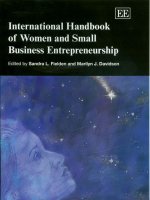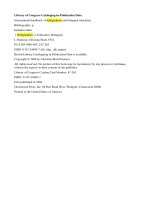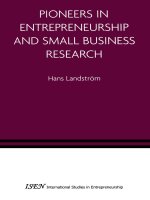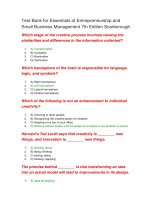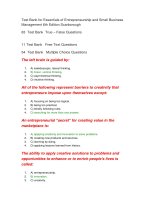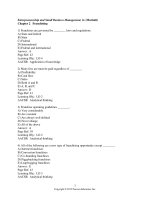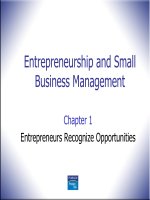INTERNATIONAL HANDBOOK OF WOMEN AND SMALL BUSINESS ENTREPRENEURSHIP docx
Bạn đang xem bản rút gọn của tài liệu. Xem và tải ngay bản đầy đủ của tài liệu tại đây (1.47 MB, 301 trang )
INTERNATIONAL HANDBOOK OF WOMEN AND
SMALL BUSINESS ENTREPRENEURSHIP
In loving memory of Vera Ellison
International Handbook of Women
and Small Business
Entrepreneurship
Edited by
Sandra L. Fielden and Marilyn J. Davidson
Manchester Business School, The University of Manchester
Co-directors of The Centre for Diversity and Work Psychology
Edward Elgar
Cheltenham, UK • Northampton, MA, USA
© Sandra L. Fielden and Marilyn J. Davidson 2005
All rights reserved. No part of this publication may be reproduced, stored in a retrieval system or
transmitted in any form or by any means, electronic, mechanical or photocopying, recording, or
otherwise without the prior permission of the publisher.
Published by
Edward Elgar Publishing Limited
Glensanda House
Montpellier Parade
Cheltenham
Glos GL50 1UA
UK
Edward Elgar Publishing, Inc.
136 West Street
Suite 202
Northampton
Massachusetts 01060
USA
A catalogue record for this book
is available from the British Library
Library of Congress Cataloguing in Publication Data
International handbook of women and small business entrepreneurship / edited by Sandra
L. Fielden and Marilyn J. Davidson.
p. cm. – (Elgar original reference)
ISBN 1-84376-012-6
1. Self-employed women. 2. Entrepreneurship. 3. Businesswomen. 4. Women-owned
business enterprises. 5. Small business. 6. New business enterprises. I. Fielden, Sandra L.
II. Davidson, Marilyn. III. Series.
HD6072.5.I58 2005
658.02Ј2Ј082–dc22
2004061476
ISBN 1 84376 012 6 (cased)
Printed and Bound in Great Britain by MPG Books Ltd, Bodmin, Cornwall
Contents
List of Contributors vii
Preface xvi
Acknowledgements xviii
PART I WOMEN INTO ENTERPRISE – PERSONALITY AND
BEHAVIOUR CHARACTERISTICS
1Why women enter into small business ownership 3
Muriel Orhan
2 Characteristics of women small business owners 17
Sherrill R. Taylor and Julia D. Newcomer
3 Analysing achievement, motivation and leadership in women entrepreneurs:
Anew integration 32
Janice Langan-Fox
4 Career paths of women business owners 42
Dorothy Perrin Moore
PART II WOMEN INTO ENTERPRISE – CONSTRAINTS AND
CONDITIONS FOR SUCCESS
5 The constraints facing women entering small business ownership 55
Leonie V. Still
6 The financing of small businesses – female experiences and strategies 66
Susan Marlow and Dean Patton
7 Succession planning in small firms: Gender impacts 78
Lynn M. Martin and Chris Martin
8 The impact of family support on the success of women business owners 91
Nancy Rogers
PART III WOMEN INTO ENTERPRISE – BLACK AND ETHNIC
MINORITY SMALL BUSINESS OWNERS
9 African American women and small business start-up: Backgrounds,
goals and strategies used by African American women in the
initialization and operation of small businesses 105
Katherine Inman and Linda M. Grant
v
10 The experiences of Asian women entering business start-up in the UK 120
Adel J. Dawe and Sandra L. Fielden
11 Ethnicity and gender in women’s businesses in New Zealand 133
Judith K. Pringle and Rachel Wolfgramm
12 Hispanic women entrepreneurs and small business owners in the USA 148
Yolanda Sarason and Morgan Morrison
PART IV WOMEN INTO ENTERPRISE – A GLOBAL PERSPECTIVE
13 Women into enterprise – a European and international perspective 161
Mary van der Boon
14 Women entrepreneurs in Singapore 178
Jean Lee
15 The changing experience of Australian women entrepreneurs 193
Susan Dann and Rebekah Bennett
16 Women small business owners in India 206
P. Sudarsanan Pillai and K.P. Saraswathy Amma
17 ‘I’m out of here’: Women leaving companies in the USA to start their
ownbusinesses 221
Mary C. Mattis
PART V WOMEN INTO ENTERPRISE – FUTURE PERSPECTIVES
AND RECOMMENDATIONS
18 Past journeys: Global lessons learned from entrepreneurial women in US
history 239
Jeannette Oppedisano
19 Women’s entrepreneurship: Exploring new avenues 253
Kiran Mirchandani
20 The way forward for women business owners 264
Sandra L. Fielden and Marilyn J. Davidson
Index 273
vi International handbook of women and small business entrepreneurship
Contributors
Rebekah Bennett is a Senior Lecturer in the School of Advertising, Marketing and PR at
QUT. She holds a Bachelor of Commerce degree, with first class honours, from Griffith
University and a PhD from the University of Queensland. Rebekah is former Deputy
President of the Australian Marketing Institute (Qld) and a lifetime member of the Golden
Key Society for graduates with outstanding academic achievement. Her special areas of
research are entrepreneurial women, brand loyalty and services marketing. Rebekah has
been published in leading specialist journals and has spoken at conferences of the American
Marketing Association, British Academy of Management and the Australia and New
Zealand Marketing Academy. She also won the ‘best paper award’ at the 2001 Market
Research Society of Australia’s national conference for her paper on brand loyalty.
Susan Dann is Associate Professor in the Brisbane Graduate School of Business, QUT.
She holds Bachelor of Arts, Master of Public Administration and PhD (University of
Queensland) degrees. Susan’s areas of research specialization include equity and gender
issues in employment (including entrepreneurial ventures) and the application of mar-
keting to non-traditional areas such as the not for profit sector, government and sport.
She is widely published in journals both within Australia and internationally and is the
author or co-author of five books in the fields of marketing and management. Susan is
the former Queensland President of the Australian Marketing Institute (AMI) and
National Deputy President. Currently she is a member of the Lay Panel of the Legal
Practices Tribunal as well as a Commissioner for the Australian Football League (AFL)
Queensland. She has held a number of previous positions on boards and government
advisory committees.
Adel J. Dawe is a Senior Researcher at the University of Manchester in the Centre for
Diversity and Work Psychology at Manchester Business School. She is currently working
on a European-funded project investigating the impact of social exclusion on the pro-
gression of women into business ownership. Her interests lie in female small business
owners, ethnicity, diversity, equal opportunities and women’s health. She spent four years
as the Chair of Rochdale’s Women’s Working Party and is currently working with women
in the area to create a Well Women’s Centre.
Marilyn J. Davidson is Professor of Managerial Psychology in the Manchester Business
School at the University of Manchester, UK. She is currently Head of the Organizational
Psychology Group and Co-Director of the Centre for Diversity and Work Psychology.
Her research and teaching interests are in the fields of occupational stress, the manage-
ment of diversity, equal opportunities, women in management and female entrepreneurs.
She has published over 150 academic articles and sixteen books, e.g. Shattering the Glass
Ceiling – The Woman Manager (with C.L. Cooper); Women In Management: Current
Research Issues Volume II (edited with R. Burke); The Black and Ethnic Minority Woman
vii
Manager – Cracking the Concrete Ceiling (short-listed for the Best Management Book of
the Year) and Individual Diversity And Psychology In Organizations (with S.L. Fielden).
Marilyn is former Editor of the MCB University Press Journal Women in Management
Review and former Associate Editorial Board Member of the Journal of Occupational and
Organizational Psychology. She is currently Associate Editorial Board Member of the
Journal of Gender Work and Organization, and the International Review of Women and
Leadership. She is a Fellow of the Royal Society of Arts; a Fellow of the British
Psychological Society; a Chartered Psychologist; a member of the Division of
Occupational Psychology (British Psychological Society – BPS); and a member of the
Division of Psychology of Women Section (BPS).
Sandra L. Fielden is a Senior Lecturer in Organizational Psychology in the Manchester
Business School at the University of Manchester, UK. She is also Co-Director of the
Centre for Diversity and Work Psychology and her research interests are in diversity,
women in management, organizational politics, female small business owners, gender and
unemployment in managers, the psychological contract, and organizational change. Her
involvement at the applied level has been with both the public and private sector, includ-
ing several European-funded research projects into female small business owners and eco-
nomic growth and black and minority ethnic small business ownership. Sandra is the
programme director for the highly successful ‘Challenging Perceptions’ commissioned by
the Leadership Centre, a leadership development programme designed to enhance the
career prospects of female nurses within the NHS. Sandra is a Chartered Psychologist and
a Fellow of the British Psychological Society. She is also Editor of the Emerald Journal
Women in Management Review,for which she was awarded Editor of the Year 2002, and
has been the chair of the ‘Gender and Management’ track for the last three years at the
British Academy of Management and is a founder member of the ‘Gender in
Management’ special interest group. She is well published with numerous journal papers
and book chapters and is co-editor of the recently published book Individual Diversity and
Psychology in Organizations (with M.J. Davidson).
Linda M. Grant is Professor of Sociology, Adjunct Professor in the Social Foundations of
Education Department of the College of Education, and is an affiliated faculty member in
Women’s Studies at the University of Georgia. She received her PhD in sociology from the
University of Michigan at Ann Arbor in 1981. Currently she serves as co-book review
editor of the journal Gender & Society and deputy editor of the journal Sociology of
Education. Her recent published works have focused on the combined effects of race and
gender on students’ everyday experiences in schooling; the impact of gender, ethnicity, and
immigration generation on youth’s educational attainment; gender and career develop-
ment of physicians and academic-based scientists; writings of early women sociologists in
the United States; and qualitative methods in social research. She directed the UGA
Summer Workshop in Fieldwork Methods at the University of Georgia in the mid-1990s.
Katherine Inman is an adjunct professor in women’s studies and the Department of
Sociology at the University of Wyoming. She received her PhD in Sociology from the
University of Georgia in 1997. Garland Press published her book, Women’s Resources in
viii International handbook of women and small business entrepreneurship
Business Start-Up: A Study of Black and White Women Entrepreneurs, in 2000. Her
research participation has included Internet surveys of rural gay men for the Wyoming
Rural AIDS Prevention Project; land use planning studies in Wyoming and Colorado for
the Agricultural and Applied Economics Department, University of Wyoming; a review
of data on the status of women in Georgia in the areas of economics, health, violence
against women, and child support and custody, for the Georgia Commission on Women;
recycling market studies for the Small Business Development Center and the Vinson
Institute of Government, University of Georgia; and recreation and environmental atti-
tude studies in Puerto Rico for the USDA Forest Service. She is currently teaching online
classes at the University of Wyoming Outreach School. Her research interests include
lesbian and gay studies, social change, social movements, women and work, and environ-
mental sociology.
Janice Langan-Fox is an Associate Professor in the Department of Psychology, at the
University of Melbourne where she has been for fourteen years. Janice has been teaching
and researching industrial/organizational psychology since 1984 and has also worked at
the Royal Melbourne Institute of Technology, Deakin University, and Monash
University. Janice’s area of research focuses on cognitive industrial psychology especially
shared cognition (e.g. teamwork), motivation (e.g. entrepreneurship; employee participa-
tion, need achievement), and factors concerned with aptitude–treatment interactions
(ATI) such as human abilities, skill acquisition, communication, and training, as well as
health-related work issues such as occupational stress, health maintenance and well-
being. Janice has had more than 10 years full-time employment in private and public
industry in Australia, New Zealand, Britain and Cyprus. Over the past 13 years, she has
had major contracts and grants from government departments, charitable foundations
and private organizations to research problems and issues important to productivity,
employee well-being and efficiency. Janice has over 100 publications in major interna-
tional handbooks, books, refereed journals and conference proceedings, and has been on
the editorial board of more than six international journals including the Journal of
Occupational and Organizational Psychology, Journal of Personality and Social
Psychology, the International Journal of Selection and Assessment, and has been Associate
Editor of the Australian Psychologist.Janice has played a major role in Australian indus-
trial/organizational psychology in creating and developing many I/O courses at under-
graduate and postgraduate level; in editing a special issue on Industrial Psychology in The
Australian Psychologist and two edited volumes (Human Performance and the Workplace)
featuring the work of major Australian researchers; in being on the National Executive
and Chair of the Course Approvals Committee, of the Organizational College of the
Australian Psychological Society; and in being Chair of the organizing committee of the
fifth Australian Industrial/Organizational Conference held in Melbourne in 2003.
Jean Lee is currently a Professor of Management and Associate Dean at Cheung Kong
Graduate School of Business (CKGSB). Prior to joining CKGSB, Dr Lee taught at the
National University of Singapore (NUS). She was the former Associate Dean of the
NUS Business School and the Founding Director of the International MBA
and Executive MBA (Chinese) programs at NUS. Dr Lee’s research interests include
Contributors ix
leadership,
corporate culture, women in management, Chinese business management,
change management, HR management and cross-culture management. She has published
extensively in local and international journals, such as Human Relations, Family Business
Review, Journal of Management Development, Asian Academy of Management Journal,
International Journal of Entrepreneurial Behavior Research, Journal of Small Business
Management, Women in Management Review, Applied Psychology, Managerial Psychology,
Management Education and Development, International Journal of Management and Asia-
Pacific Journal of Management. She has served as the Associate Editor of the Asia-Pacific
Journal of Management. Dr Lee has consulted and conducted training programmes for
many multinational, local and international organizations in South-East Asia and main-
land China, such as Singapore Airlines, the Bank of China, Johnson & Johnson, Xian
Janssen Pharmaceutical Co., Asahi Techno Vision Pte Ltd, Leader Steel Ltd, Public
Package Sdn Bhd, Teckwah Industrial Corporation and Koh Brothers Ltd. She also serves
as Independent Director of several companies. She is currently a Senior Consultant to the
Grandtour Tire Co. (China Headquarters) and Hong Kong International Holdings Ltd.
Susan Marlow is Principal Lecturer in Human Resource Management at Leicester
Business School where she teaches both undergraduate and post-graduate students. She
has extensive experience of both research and consultancy in the small-firm sector, has
published extensively in academic journals and the wider media, and has also held a
number of research awards to investigate issues of ethnic entrepreneurship, female self-
employment and employee relations in smaller firms.
Chris Martin is an ownership succession and knowledge transfer facilitator and consul-
tant working both directly with SME owners and with business advisers. He has under-
taken extensive research into ownership succession processes and completed succession
projects for Birmingham City Council and the Small Business Service as well as a member
of the University of Central England Knowledge Management Centre. His PhD thesis
was on SME ownership succession from an intellectual capital perspective.
Lynn M. Martin is Senior Academic for Innovation and Entrepreneurship at the Business
School, the University of Central England. She has owned her own small business,
worked as a senior manager in further education and as a freelance consultant in the UK
and Germany. Her key research interest is innovation in SMEs, especially related to tech-
nology, although she has also published research studies on the role of women in small
firms and knowledge processes at micro and macro level linked to innovation and change.
(Chris Martin and Lynn M. Martin share a surname but are not related in any way except
for mutual research interests.)
Mary C. Mattis is the Staff Officer for the Diversity Program of the National Academy
of Engineering (NAE) in Washington, DC. Dr Mattis directs the work of the NAE
Diversity Program, supports the NAE Standing Committee on Diversity and the
Engineering Workforce, and manages the NAE Celebration of Women in Engineering and
EngineerGirl! websites.
x International handbook of women and small business entrepreneurship
Prior to joining the NAE, Dr Mattis held a variety of research and executive positions
at Catalyst and at the Center for Gender in Organizations, Simmons Graduate School of
Management. She has researched and written extensively on gender issues in the private
sector, in particular, women on corporate boards and corporate gender equity initiatives.
At Catalyst, she directed Catalyst’s research on women’s leadership development, annual
censuses of women on corporate boards and women corporate officers of Fortune 500
companies, and evaluations of gender equity initiatives for the Catalyst Award.
Dr Mattis has authored numerous book chapters, journal articles and technical reports
on diversity in the US and international workforce, and has co-authored/edited several
books. Her most recent publications are (with R. J. Burke) Supporting Women’s Career
Advancement: Challenges and Opportunities (2005, Edward Elgar), and ‘Women entre-
preneurs: out from under the glass ceiling’, in Women in Management Review (19 (3),
2004). Her current research interests include diversity in the engineering workforce,
women’s leadership development, and best practices for advancing women and under-
represented minorities in corporations and academia.
She received her bachelor’s degree from Oakland University, Rochester, MI, and her
master’s and PhD from Washington University, St Louis, MO.
Kiran Mirchandani is an Associate Professor at the Ontario Institute for Studies in
Education of the University of Toronto. She has published on home-based work, tele-
work, contingent work, entrepreneurship and self-employment. She teaches in the Adult
Education and Community Development Program (workplace learning and change
focus), and offers courses on gendered and racialized processes in the workplace; critical
perspectives on organizational development and learning; and technology, globalization
and economic restructuring. Her current research projects are on multinational call centre
workers in India, work-related learning amongst contingent workers in Canada, and
transnational forms of home-based work.
Dorothy Perrin Moore is the Distinguished Professor of Entrepreneurship at The Citadel,
in Charleston, South Carolina. She holds a PhD in management, organizational behav-
iour, and human resource management from the University of South Carolina. Her most
recent book, Careerpreneurs: Lessons from Leading Women Entrepreneurs on Building a
Career Without Boundaries, published in August, 2000 by Davies-Black Publishing, was
named the Business Book of the Year by ForeWord Magazine. Professor Moore is also the
first author of Women Entrepreneurs—Moving Beyond the Glass Ceiling, published by
Sage Publications, Inc. in 1997.
Morgan Morrison is a Doctoral Candidate at Colorado State University in industrial/
organizational (I/O) psychology. She received a Master’s degree in I/O psychology at
George Mason University. Her research interests revolve around the design and valida-
tion of personnel assessment tools for the purposes of employee selection, appraisal, and
training. Before coming to Colorado State University, Ms. Morrison worked as a research
associate for the Human Resources Research Organization (HumRRO) in Alexandria,
Virginia, and developed her principal competence in the areas of job analysis and the
development and administration of professional certification programmes.
Contributors xi
Julia D. Newcomer is an Assistant Professor of Management at Texas Woman’s
University. Her area of specialization is human resource management; she also developed
for the university, and teaches, a course in Women in Business. Her PhD is from the
University of North Texas, and she has completed post-doctoral work at the Carlson
School of Management at the University of Minnesota. Her M.A. (political science) is
from Kent State University, and her Bachelor of Journalism was earned at the University
of Missouri. She has decades of personal experience seeking a balance in work/life
conflict and is familiar with what Arlie Hochschild calls the second-shift and time-bind.
Jeannette Oppedisano is a Professor and Chairperson in the School of Business at
Southern Connecticut State University and is a participant in the women’s studies pro-
gramme there as well. She earned her BA in English Education and her MS in educational
administration in higher education from the State University of New York at Albany. Her
PhD in management is from Rensselaer Polytechnic Institute. Dr Oppedisano has practi-
tioner experience as an executive administrator, a teacher, a researcher, and an entrepre-
neur. For more than ten years, she has been writing about and encouraging the direct
approach of economic independence for girls and women as a faster, more effective, less
emotionally debilitating route to equality. In the fall of 2000, Dr. Oppedisano published
the first Encyclopedia of American Women Entrepreneurs 1776 to the Present (Greenwood
Press). Her articles and case studies have appeared in the New England Journal of
Entrepreneurship, Collection of International Case Studies, Journal of Leadership Studies,
NWSA Journal (National Women’s Studies Association), Cases in Management and
Leadership, A Leadership Journal: Women in Leadership – Sharing the Vision as well as in
many academic proceedings. Dr. Oppedisano established the first women’s multidiscipli-
nary entrepreneurship course at Skidmore College and the first to be offered at Southern
Connecticut State University. While at Skidmore, she also spearheaded the effort to bring
the summer entrepreneurship programme for teenage girls, Camp $tart-Up, to the college.
Muriel Orhan,who died in February 2003, was Lecturer in Entrepreneurship at UQ
Business School, University of Queensland, Brisbane (Australia). She graduated from the
‘Ecole Superieure de Commerce de Rennes’ in France and held a master of art in inter-
national business from South Bank University, London. At the time of her death she was
completing a PhD on the influence of external resources on entrepreneurial performance.
Between 1997 and 2000, she was Research Associate and Coordinator of the Centre of
Research and Studies EURO PME in Rennes, France. Her book, Les Femmes
Entrepreneurs en France [Women entrepreneurs in France], written with Dr Bertrand
Ducheneaut, was released in February 2000 (edition Seli Arsan, Paris). She was awarded
the Literati Award of Excellence for the ‘most outstanding paper’ published in Women in
Management Review in 2001 (co-authored with Don Scott).
Dean Patton is a Principal Lecturer at De Montfort University in the Department of
Corporate Strategy. He has worked extensively within the SME sector on a range of con-
sultancy initiatives and from this work has published widely both within academic jour-
nals and related media. Currently he is working on the application of strategy theory
within a small firms’ context.
xii International handbook of women and small business entrepreneurship
Judith K. Pringle is a Senior Lecturer in the Department of Management and
Employment Relations at the University of Auckland. She teaches and researches in the
areas of gender, organization and diversity. Recent research includes: the experiences of
senior women managers, influences of gender and ethnicity in women-run organizations,
and reframing careers.
Nancy Rogers, PhD is a Research Associate in the Evaluation Services Center of the
University of Cincinnati where she conducts programme evaluation and evaluation
research. She is also an Associate Professor for the College of Arts and Sciences at the
University of Cincinnati where she teaches courses in the social sciences and entrepre-
neurship. Previously, Dr Rogers served as Program Manager at the Small Business
Development Center for nearly a decade, working extensively with women and small busi-
ness owners developing their businesses. Additionally, through leadership in small busi-
ness organizations including Women Entrepreneurs, Inc. and Minority Business
Opportunities Committee, she worked closely with small business owners, helping them
design strategies for success. These relationships stimulated her research interest in entre-
preneurship and in the role of social support for business owners’ success. In 1998, her
research in entrepreneurship resulted in recognition by the Cincinnati Psychological
Association for Best Doctoral Thesis. A small business owner, herself, Dr Rogers appre-
ciates the importance of social support to success.
Yolanda Sarason is Assistant Professor at Colorado State University in the College of
Business. Her degrees include a PhD in strategic management from the University of
Colorado and a MBA in finance from the University of Colorado. Professor Sarason’s
research interest focuses on the strategic management of technology-based ventures,
entrepreneurship and entrepreneurship issues related to ethnicity. She has published arti-
cles on the management of technology, entrepreneurship, and strategic management in
the following journals: The Journal of High Technology Management, Journal of New
Business Venturing, The Journal of Management Education and the Hispanic Journal of
Behavioral Science.
K.P. Saraswathy Amma is a Reader, Postgraduate Department of Commerce and
Management Studies, NSS College, Nemmara, University of Calicut, India, and has
taken a degree and postgraduate degree from the University of Kerala. She was awarded
her doctorate degree for the research carried out in the area of ‘women entrepreneurship’,
from Cohin University of Science and Technology, India. She has published over fifteen
papers in journals and conferences. She has guided many M Phil and MBA Projects. Dr
Saraswathy has 26 years of postgraduate teaching experience.
Leonie V. Still is Director of the Centre for Women and Business within the Graduate
School of Management, the University of Western Australia. The Centre is primarily a
research facility devoted to advancing the interests of women in management, women in
small business and women in business and the professions. Leonie’s research interests lie
in these areas and she has published eight books and monographs on these topics, as well
as numerous articles and conference papers. She was also the founding editor of the
Contributors xiii
journal International Review of Women and Leadership. Current research topics include
generational change in men and women in management, the career development of
women managers, a national study of women in small to medium sized businesses, and
women’s work in call centres.
P. Sudarsanan Pillai M.A.(Econ); M.Com.; LL.B; PhD is Professor and Director of
School of Management Studies at Cochin University of Science and Technology, Kochi
– 682 022, Kerala, India. He is also the Dean, Faculty of Commerce and Management at
Kannur University, Kannur and Dean, Faculty of Commerce at Mahatma Gandhi
University, Kottayam, two other universities in Kerala. He had been the Head of the
Department of Commerce at Cochin University of Science and Technology. He has also
served on academic bodies and selection committees at several universities and industrial
organizations in India. His most recent research project was ‘A study of the Management
Practices in Rubber Plantation Industry in India’, funded by the Indian Council of Social
Science Research. This in-depth comparative analysis of the management practices fol-
lowed in the rubber plantation industry in India and Malaysia has been acclaimed as a
pioneering study in the area of plantation management. He has researched extensively in
the areas of plantation management, entrepreneurship development, banking, commerce,
economics, law and rural development and authored about eighty-five research papers
published in national and international journals. Several scholars have completed their
MPhil and PhD dissertations under his guidance. He is at present researching on the
project ‘A study of the management of rubber small holdings in India and other Asian
countries’, comparing the management practices in rubber small holdings in India,
Malaysia, Indonesia and Thailand.
Sherrill R. Taylor MBA, SPHR has been a Lecturer in Management at Texas Woman’s
University, School of Management since August of 1990. She is also the Director of the
TWU Small Business Institute® and the current Immediate Past President for the Small
Business Institute Director’s Association (SBIDA). In the past, she has served the orga-
nization as VP-Publications and VP-Case Competition and VP-Programs. In September
of 1995, Ms. Taylor co-authored ‘A study of women-owned businesses in the Dallas/Fort
Worth Metroplex’. It was through this study, and the study sponsors (NAWBO,
Dallas/Fort Worth Chapter) that Ms Taylor became more interested in emerging and suc-
cessful female entrepreneurs. Her interest is reflected in the small business consulting cases
completed by her students (48 per cent are woman-owned) as well as in her academic
paper submissions to various conferences concerning the topics relevant to women busi-
ness owners. Her involvement in supporting the efforts of women-owned businesses was
instrumental in TWU receiving the National Showcase Award in 1998 (from the SBIDA
organization) for their Small Business Institute® programme. In the past she has served
as a volunteer judge for the Small Business Administration’s (Dallas District Office)
Entrepreneur of the Year Awards. Ms Taylor has been named in the 20th Edition of Who’s
Who of American Women and was named by the HR Southwest Conference as the 1999
HR Educator of the Year. In 1999, she was named as the TWU School of Management
Distinguished Alumnae. Ms. Taylor also has been recognized as a Sam Walton Free
Enterprise Fellow for SIFE (Students in Free Enterprise). This position allows her to
xiv International handbook of women and small business entrepreneurship
mentor students, as they become involved in teaching the people in the local communities
to compete in the world of ‘free enterprise’.
Mary van der Boon is Managing Director of global tmc international management training
& consulting based in the Netherlands. She provides an extensive range of services as inter-
cultural and diversity management trainer and consultant to multinational, governmen-
tal and non-governmental organizations based in Europe, the Middle East, North
America and Asia. She has lived and worked outside her native Canada for almost 30
years and speaks Dutch, Thai, Lao, Malay, and Bahasa Indonesia in addition to English
and French. Building on studies in journalism and communications, Mary studied
anthropology and traditional law at one of Indonesia’s oldest universities and is an MBA
candidate in International Management at Leiden University School of Management.
She is distance learning facilitator for the University of British Columbia’s Certificate in
Intercultural Studies and is a member of the European Institute for Managing Diversity
in Barcelona and regularly conducts programmes on diversity management for this insti-
tute and others. She lectures frequently at top business schools in Europe and North
America on international management issues including women in management. She
is contributing author to Career in Your Suitcase,a guidebook for international profes-
sional women. Mary speaks and participates frequently at international conferences,
including the Women’s International Networking Conference, Women’s Leadership
Summit, Global Living, the European Southeast Asia Society (EUROSEAS), and
SIETAR (Society of Intercultural Educators, Trainers and Researchers), and as an
active business journalist has contributed to www.expatica.com/hr, the Xpat Journal, the
Women in Management Review, the Weekly Telegraph, the Eurograduate and many other
publications.
Rachel Wolfgramm is a Lecturer in the Department of Management and Employment
Relations at the University of Auckland. She teaches organizational behaviour and man-
agement. Her PhD research explores cultural complexity in contemporary indigenous
organizations using Maori organizations as cases. Other areas of research include gender,
ethnicity, innovation and economic models of sustainable development within Maori
Pacific and indigenous communities.
Contributors xv
Preface
The number of women entering small business ownership has increased significantly
across the world. These women make a crucial contribution to the economic growth and
development of local, national and global economies. Yet, despite their increasing
numbers, they have received little attention from the academic community and research
into the experiences of women small business owners is confined to a handful of coun-
tries. The work on women entrepreneurs is far more extensive and generally eclipses the
area of small business ownership. In entrepreneurial research, the emphasis has tended to
be on the experiences of women originally from senior corporate management back-
grounds, whereas small business research encompasses women from a wide range of
social, economic and educational backgrounds.
It is suggested that entrepreneurs demonstrate inventive tactics that are employed to
achieve long-term growth and profitability, whereas small business owners are motivated
towards their own goals rather than expansion and profitability (e.g. Carland et al., 1984).
As women tend to be classed as small business owners rather than entrepreneurs does this
mean that they are less ambitious or motivated than their male counterparts? Past
research suggests that it is not the degree of ambition or motivation that differs but the
form that ambition takes, with women using personally defined intrinsic measures of
success as opposed to extrinsic, financial measures (Buttner and Moore, 1997). If entre-
preneurial success is based on a male-defined model of success that women do not
conform to, does this make women less successful?
Given that women still have to balance work and home responsibilities, small business
ownership is an attractive alternative to paid employment. Research indicates that women
frequently enter into new enterprises because employment does not provide them with the
flexibility, control or challenge that is offered by business ownership (e.g. Fielden et al.,
2000). Many women do not have the skill base or experience of their male counterparts
and this may not only inhibit the progress of these women, but may also act as an effective
barrier to the entry of other women into business ownership. This lack of business back-
ground is not accidental, rather it is fostered by the educational system and is enhanced
by employment practices that seek to keep women out of the management positions that
would give them the opportunity to acquire and develop relevant skills and experience.
Moreover, the evidence would suggest that women do not lack the motivation to enter
business ownership and indeed, they often need to be even more highly motivated than
their male counterparts if they are to overcome the barriers to business start-up that they
inevitably encounter (Shaw et al., 2001; Walker, 2000).
This book is divided into five parts and presents an up-to-date, theoretical review as
well as practical initiatives and strategies relating to the experiences of women entering
small business ownership in the twenty-first century. The first part explores the personal-
ity characteristics and behaviour of new and established women small business owners,
along with the factors that drive women into entrepreneurship. Part II examines the con-
straints that serve to inhibit women’s success along with the strategies they use to achieve
xvi
success, as defined by women themselves. The third part explores the experiences of
women small business owners from different ethnic backgrounds, followed by Part IV
which provides a global perspective on women entrepreneurs. The final part considers the
future perspectives of research into women and small business ownership and, in the last
chapter, we draw together the main issues and themes presented throughout this book and
propose new research directions and ways forward for women into enterprise.
S L. F M J. D
References
Buttner, D. and H. Moore (1997), Women Entrepreneurs: Moving Beyond the Glass Ceiling, Thousand Oaks, CA:
Sage.
Carland, J.W., F. Hoy, W.R. Boulton and J.A.C. Carland (1984), ‘Differentiating entrepreneurs from small busi-
ness owners’, Academy of Management Review, 9, 354–9.
Fielden, S.L., M.J. Davidson and P.J. Makin (2000), ‘Barriers encountered during micro and small business start-
up’, Journal of Small Business and Enterprise Development, 7 (4), 295–304.
Shaw, E., S. Carter and J. Brierton (2001), Unequal Entrepreneurs: Why Female Enterprise is an Uphill Business,
London: Industrial Society Policy Paper.
Walker, E. (2000), The Changing Profiles of Women Starting Small Businesses, Discussion paper series:
University of Western Australia.
Preface xvii
Acknowledgements
We would like to thank and acknowledge the valuable assistance of Cath Hearne for her
expertise in the coordination of the manuscripts and the managing of correspondence.
Her enthusiasm and initiative have proved invaluable. Finally, we are also grateful to
Stuart Fielden for his time given to proofreading.
xviii
PART I
WOMEN INTO ENTERPRISE –
PERSONALITY AND
BEHAVIOUR
CHARACTERISTICS
Muriel Orhan
Introduction
The emergence of women entrepreneurs in the world economy has been a major devel-
opment since the 1980s. Typically, women-owned firms make up one-quarter to one-third
of the total business population across countries (NFWBO, 1997, OECD, 2000). In the
United States and Canada, women have been starting businesses at double the rate of men
during the 1990s and have been sometimes considered as the new economic driving force
of these countries (OECD, 2000). In Europe, the situation is more contrasted, with
Nordic countries such as Sweden having experienced a 50 per cent increase in female
entrepreneurship during the 1990s, whereas France, for instance, has observed a steady
rate of around 30 per cent of the new businesses created by women each year. However,
a proper assessment of the economic significance of women-owned enterprises is impeded
by the general lack of information in this area (Duchéneaut, 1997).
The creation of a business is of course the result of a decision, but the element of
freedom of choice in the decision may be more or less important. The issue of female
entrepreneurs’ motivation is addressed in this chapter on the premises that different
motivations lead to different business outcomes, including, in particular, different levels
of subsequent firm growth. Indeed, despite the lack of empirical validation, it has been
asserted that:
A person who becomes a ‘stand-alone’ self-employed worker with no prospect of expanding his
or her business generally does so for economic reasons and in order to be independent, as an
alternative to salaried employment. An entrepreneur who creates a business with real growth
prospects or who, at the very least, works in association with a team of colleagues, is motivated
by additional factors which may include self-fulfilment, social status or power or a perceived
social mission (creating employment and participating in economic development). (Duchéneaut,
1997, p. 43)
This chapter goes beyond this simple dualistic approach by exploring the complex system
of interacting motivations which make up the reasons why women become entrepre-
neurs. After an overview of the research into women’s reasons for entering into small
business ownership, an integrated model is developed, based on gender and entrepre-
neurship theories, and on empirical qualitative research. A typology is derived from the
model and empirical data, that presents a different perspective on the motivations of
female entrepreneurs to that which is classically found in the literature. The context of
study in this chapter is small business ownership, be this self-employment or other small
business or entrepreneurial ventures. Whether the business was created, purchased or
inherited, also does not make a difference to the terminology used and the terms ‘entre-
preneurship’, and ‘entrepreneurs’, are often used in place of the terms ‘small business
ownership’ and ‘owners’.
3
Overview and limitations of current research
A variety of motivations may lead women to become small business owners. First, the
‘Push/Pull’ classification is presented as it has often been used in discussions about entre-
preneurial motivation. Second, the research that looked into similarities or differences
between the motivations of men and women for becoming entrepreneurs is examined.
Third, empirical studies that investigated the existence of links between initial motiv-
ations and business performance are reviewed. Finally, the family and social environment
influence on the decision to enter small business ownership is analysed.
Push/pull motivations
The Push/Pull classification of entrepreneurial motives was used by Shapero and Sokol
(1982), Cooper and Dunkelberg (1986) and by Feeser and Dugan (1989). Indeed, these
classifications are often referred to throughout this book when discussing the numerous
research issues related to female entrepreneurship (e.g. see Chapter 5). Push factors drive
individuals towards small business ownership not so much out of choice as out of neces-
sity. Originally linked with dissatisfaction with one’s current position (Amit and Muller,
1994), push factors mainly involve dissatisfaction with a salaried job, difficulty in finding
a job, or insufficient family income. This list may be extended to include a desire for a
flexible schedule in order to balance professional and family life (Duchéneaut, 1997). Pull
factors attract individuals into entrepreneurship because of the potential for the business
concept and the prospective future value for the individual. This value is usually com-
prised of independence, self-fulfilment (or self-achievement), entrepreneurial drive, desire
for wealth, social status and power, or social mission (Solymossy, 1997). There is rarely
a clear-cut situation of necessity or choice, and most entrepreneurs are influenced by
a combination of both push and pull components (Brush, 1990).
Many recent surveys from developed countries have ranked the pull factors of inde-
pendence and self-achievement as the primary motivations for women to start or to buy a
business (Holmquist and Sundin, 1988; Shane et al., 1991; Capowski, 1992; Buttner and
Moore, 1997; Hisrich et al., 1997; Orhan and Scott, 2001; APCE, 2001). Different pull
motivations have also been considered to be of primary importance by other authors.
Brush (1992) suggested that future research into women entrepreneurs should test for
new motives such as flexibility, social contribution and affiliation. Other pull motiv-
ations include the ‘desire to control their futures and financial destinies’, ‘need for
self-determination and financial independence’, ‘belief in doing things in a better way’
(Capowski, 1992) and ‘desire to realize one’s own ambitions or to face a challenge’ (Breen
et al., 1995).
However, push factors also seem to constitute a part of the decision to become entre-
preneurs. Hisrich and Brush (1985) found that the most frequently cited motivations by
American women entrepreneurs, were the push factors of ‘frustration’ and ‘boredom in
previous jobs’, followed by ‘interest in the business’, with the pull factor of ‘autonomy’ a
distant third. Kaplan’s findings (1988) also confirmed ‘job frustration’ as the predominant
female motivation. Stokes et al. (1995) found that women see the work environment in
large organizations as significantly more hostile to them than to men, especially because
of a glass ceiling
1
for female middle managers. Another hostile aspect can be discom-
fort with a dominant masculine business culture characterized by ‘hierarchy’, ‘old-boys’
4 International handbook of women and small business entrepreneurship
networks’ and ‘the use of directive power’ – as opposed to the soft influence, based on
consensus and empowerment of employees that is perceived to be more feminine (Kanter,
1977; Cockburn, 1991; Sinclair, 1998).
Another specifically female push factor is a desire to create employment that will allow
for flexibility to manage the dual responsibilities of work and family (Goffee and Scase,
1985; Chaganti, 1986; Holmquist and Sundin, 1988; Birley, 1989; Brush, 1990; Breen
et al., 1995; Buttner and Moore, 1997; Stephens and Feldman, 1997; Duchéneaut and
Orhan, 2000). In itself, the desire to balance work and personal life may not be a specif-
ically female motivation, or a ‘push’ factor. However, although men increasingly share
family responsibilities, it is not yet the norm, and entrepreneurship may become the only
way for women to simultaneously accommodate their work and child-rearing (Cromie,
1987) and in that case cannot be considered as a choice but as a necessity.
Similarities/differences between male and female business owners
The issue of similarities or differences in the motivations of male and female business
owners is generally unresolved. Fischer et al. (1993) tested the hypothesis that women
differ from men in their entrepreneurial motivation, which was not supported by their
data. What seems to emerge from past research is that ‘a desire for independence is a
strong motivator for both male and female entrepreneurs’ (Shane et al., 1991; Brush, 1992;
Hisrich et al., 1997; Feldman and Bolino, 2000; Orhan and Scott, 2001; APCE, 2001).
Furthermore, self-accomplishment is another major motivation which characterizes both
genders (Brush, 1992; Gatewood et al., 1995; Orhan and Scott, 2001).
However, secondary motivations tend to differ between males and females. Achieving
a higher position in society and more status and prestige were more important for men
than for women (Shane et al., 1991; Orhan and Scott, 2001) whereas women rated getting
recognition as more important than did men (Shane et al., 1991; Hisrich et al., 1997).
Helping others, or social motivation, has also been found to be a motivator for women to
become business owners (Thompson and Hood, 1991). According to Still and Timms
(2000) women start their own business in order to ‘make a difference’, that is being ‘more
client-focused than men, ethical in operations and making a social contribution in add-
ition to pursuing economic motives’ (p. 3). Some female managers have not found this
approach to be encouraged in their former corporate positions (McKenna, 1997) and the
resultant dissatisfaction may have motivated them to start their own businesses.
Buttner and Moore (1997) suggest that when entering into business ownership, push
factors may be amore important influence for women thanfor men. Asdiscussed inthe pre-
vious section, women may enter self-employment to increase flexibility to be able to attend
to family matters. Another consideration is the lack of promotional opportunities (Breen
et al., 1995), or ‘glass ceiling’, and thus business ownership can be a way to avoid discrim-
ination in the workplace (Carr, 1996). However, in their study of American executive and
professional women leaving large organizations to start up a business, Buttner and Moore
(1997) found that only a minority reported discrimination as having been a motivation to
do so. In some studies, females also rated economic necessity, expressed as creating one’s
job, as a more important motivation than did males (Hisrich et al., 1997, APCE, 2001).
Authors have tended to conclude either that there are more similarities than differences
between male and female motivations to start or to buy a business (Chaganti, 1986;
Why women enter into small business ownership 5
and because they were frustrated with the corporate environment (44 to 17 per cent).
More than four in ten women business owners self-identified with the following two state-
ments: (1) Your contributions were not being recognized or valued; and, (2) You were not
taken seriously by the employer or supervisor (NFWBO, 1998a).
Five major factors identified as best motivating Singaporean female business owners
were: (1) the perceived presence of a business opportunity; (2) the desire to put their
knowledge and skills into use; (3) the need for freedom and flexibility; (4) the desire to
achieve personal growth and recognition; and (5) the need to make more money for finan-
cial independence (Teo, 1996). Moreover, it was the prospective female owners’ own per-
sonal decision to start a business in fulfilling their sense of self-worth, and not the
influence of family and friends, that inspired them. Also mentioned were loss of job or
inability to find a suitable job, encouragement by government, taking over the family busi-
ness, and finding the previous job too demanding and stressful.
Australian female business owners were motivated by employment related factors, such
as general dissatisfaction with previous employment and lack of promotional opportun-
ities (Breen et al. 1995). Motivators unrelated to employment included the desire to realize
personal ambitions or to face a challenge, the hope of gaining independence through
becoming one’s own boss, and the need for flexibility to tend to family matters. Similarly,
Polish women cited the need for achievement, the desire to be independent, the need for
job satisfaction, economic necessity, the need for money as a measure of success, creating
an organization that could inspire, motivate, and reward psychologically and financially,
the need to control their own fate, the desire to avoid being in a subordinate relationship
with others, and self-actualizing needs. More often than men, women indicated that they
strongly disliked their previous bosses and they felt that they could do a better job than
their previous supervisors (Zapalska, 1997).
A group of low-income women in a rural area of a Midwestern (USA) state opted for
sole business ownership as a strategy for becoming economically self-sufficient (Egan,
1997). These women averaged 35.7 years and had one to four children. All had received
welfare for 2.5 years to 12 years after divorcing husbands or leaving partners. Subsequent
to starting their own businesses, all had completed self-employment training programmes.
The staff from these training programmes often served as mentors as well as counsellors.
The women viewed the receipt of welfare as a personal failure; it did not reflect their self-
concept or their sense of responsibility. The decision to become self-employed fulfilled a
lifelong dream. Two-thirds of the women reported having empowering families, including
Characteristics of women small business owners 25
Table 2.3 Percentage of women who were fulfilling a lifelong
dream by becoming business owners, USA, 1998
Black women 57
Native American/Alaska Native women 55
Hispanic women 52
Asian women 43
Caucasian women 39
Source: NFWBO (now CWBR) (1998a).

